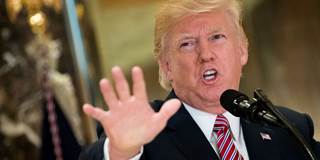A quarter-century ago, the West was riding high: Communism was passé, Europe was uniting, and US global leadership faced no serious challenge. Four new books examine how it all came apart – and what comes next.
For nearly a generation, the West has been experiencing something like progress in reverse. With the fallout from the US-led Iraq War spreading instability from the Middle East to Europe, the 2008 financial crisis undermining voters’ faith in liberal capitalism, and nationalist populism resurgent almost everywhere, anyone pondering the fate of the West in 2017 could be forgiven for seeking some cheer or consolation.
These four new books will not provide it. On the contrary, a cultural historian might one day argue that these offerings, among many others in the publishing pipeline, reflected a morbid state of introspection in the West, sustained by the mounting political and economic challenges of their time.
Bill Emmott, a former editor of the Economist, uses a stream of D-words to describe the West’s current predicament: “demoralized, decadent, deflating, demographically challenged, divided, disintegrating, dysfunctional, declining.” Superficially viewed, Emmott’s book amounts to a seemingly aimless tour of randomly selected countries: one minute we are in Italy or Sweden, and then it’s off to Japan via California. And while Emmott never really explains why Japan is “Western,” China, by contrast, is grouped among the “barbarians at the gates,” along with the Islamic State (ISIS) and Russia. But surely Chinese unilateralism is no match for the “exemptionalism” that has characterized the United States’ approach to international bodies such as the International Criminal Court and the Law of the Sea treaty.

For nearly a generation, the West has been experiencing something like progress in reverse. With the fallout from the US-led Iraq War spreading instability from the Middle East to Europe, the 2008 financial crisis undermining voters’ faith in liberal capitalism, and nationalist populism resurgent almost everywhere, anyone pondering the fate of the West in 2017 could be forgiven for seeking some cheer or consolation.
These four new books will not provide it. On the contrary, a cultural historian might one day argue that these offerings, among many others in the publishing pipeline, reflected a morbid state of introspection in the West, sustained by the mounting political and economic challenges of their time.
Bill Emmott, a former editor of the Economist, uses a stream of D-words to describe the West’s current predicament: “demoralized, decadent, deflating, demographically challenged, divided, disintegrating, dysfunctional, declining.” Superficially viewed, Emmott’s book amounts to a seemingly aimless tour of randomly selected countries: one minute we are in Italy or Sweden, and then it’s off to Japan via California. And while Emmott never really explains why Japan is “Western,” China, by contrast, is grouped among the “barbarians at the gates,” along with the Islamic State (ISIS) and Russia. But surely Chinese unilateralism is no match for the “exemptionalism” that has characterized the United States’ approach to international bodies such as the International Criminal Court and the Law of the Sea treaty.